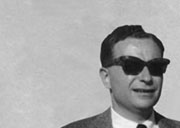|
The Culture Vultures
By Laura Brahm
The Cultural
Cold War: The CIA
and the World of Arts and Letters
By Frances Stonor Saunders
The New Press
509 pages, $29.95
Are you now, or have you ever been, a dupe of the CIA? In the aftermath of the revelations in Frances Stonor Saunders' new book, The Cultural Cold War, this is the question readers may now wonder about the great artists, writers and musicians of the 20th century. While the CIA's aggressive attempts at political manipulation at home and abroad during the Cold War are old news, Saunders makes that Strangelovian era even stranger, by presenting definitive evidence that the CIA not only infiltrated but ran some of the most respected and influential modern cultural institutions, publications and artistic movements.
 |
|
Irving Kristol, secret agent man.
Credit: The New Press |
It all started in 1947. Among the ruins of impoverished, bombed-out Berlin, "an unnaturally elaborate cultural life was dragged to its feet by the occupying powers as they vied with each other to score propaganda points," Saunders writes. The Russians staged a grand opera; the United States decided it should too. The Soviets opened a "House of Culture" on Berlin's main drag to display its cultural superiority; the Americans responded by instituting the Amerika-Häuser. A cultural arms race was born. The task of dispelling the overseas reputation of America as "culturally barren, a nation of gum-chewing, Chevy-driving, Dupont-sheathed philistines" became as pressing as demonstrating its military strength. Europe was flooded with "appropriate" American music, plays, books and art in a kind of "reverse Entartekunst."
1947 also marked the birth of the CIA, whose mission dovetailed nicely with that of the burgeoning cultural Cold War. Although the CIA's violent and misguided interventions into other nations' affairs later gave it the reputation for being staffed by brutish "ugly Americans," Saunders reminds us that the agency was much more genteel: "The dominant early influence was the 'aristocracy' of the eastern seaboard and the Ivy League, a Bruderbund of Anglophile sophisticates who found powerful justification for their actions in the traditions of the Enlightenment and the principles enshrined in the Declaration of Independence."
These gentleman soldiers of the nascent Cold War soon decided that the most effective strategy was to prevent their fellow elites from becoming fellow travelers. The real issue, in the words of one anti-Stalinist firebrand, was "to win the educated and cultured classes - which, in the long run, provide moral and political leadership in the community." With inspiration and assistance from ex-Communist Arthur Koestler, the agency targeted the intelligentsia of the "Non-Communist Left" - with or without their knowing it - to act as the vanguard of American values.
Laura Brahm edits and writes for the Carnedie Council on Ethics and International Affairs, but is not a puppet of the CIA.
![]()
|
In These Times ©
2000
Vol. 24, No. 12 |
